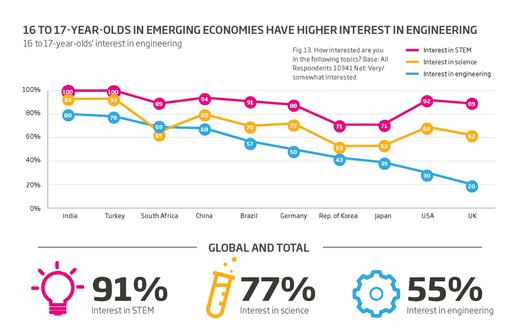Engineering: Inspiring the next generation

Categories: Technology
On Monday 26th October, we released a report on perceptions of engineering across the world. Here are some key points from Chapter 3: Inspiring the next generation.
Respect for engineering’s contribution to society is almost universal, meaning the future of the sector looks bright. However, exactly how bright depends on perspective. In countries that have recently experienced economic growth, the profession holds huge attraction for the next generation. In both India and Turkey, around 80% of 16 to 17-year-olds say they are interested in engineering. However, that figure drops to just 20% in the UK, where interest is greatest among those 45 and over. This trend is replicated across other more established economies, such as Japan and the USA. It also endures despite the overall appeal of STEM-based careers remaining high.In order to turn respect into action, the sector must find a way to motivate the engineers of tomorrow. With young people claiming to be driven not by money or prestige but by a wish to contribute to society and build a long-term career, this means demonstrating how an engineering career can match their ambitions and desires - at both global and local levels.
Younger generations in emerging economies are more interested in engineering than their older counterparts while the reverse is true for developed markets. Professor Lynn Gladden at the University of Cambridge notes, “In South Africa the interest in engineering surpasses that of mainstream science. Why is this? Maybe the ‘difference that engineering makes’ is much more obvious first hand in the emerging economies. Combine this with the more balanced drivers of societal benefit and career opportunity in influencing the career selection of these young people, and you will see some of the brightest minds taking up careers in engineering”

Cultural differences on the perception of engineering as a career are even greater when we analyse the main motives for pursuing the profession - with younger generations being either more driven by contribution to society or career opportunity depending on the market. Erik Bonino, Chairman of Shell UK, emphasises the career opportunities available: “Engineers have revolutionised our world… Engineers are also the lifeblood of our company. Their ingenuity and innovation enables us to undertake incredibly complex projects across the world.” And Dr Robert Langer, MIT professor and winner of the QEPrize, reflects on engineering’s potential for society: “I think engineering is a wonderful way to contribute to society. The two things that give me the greatest satisfaction are discovering principles or making inventions that enable people to have happier and healthier lives, and seeing the people who train in our lab do well and get jobs where they become leaders in engineering themselves… I think the people who come to our lab do so because they share the same mission I do - which is to create engineering principles that can make the world a better place.” Contribution to society drove Japan toward engineering more than the other nine countries. Professor Hiroshi Komiyama, President of Japan’s Engineering Academy, observes, “Generally, the industrial structure of developed countries sees more people engaged in the services industry than the manufacturing industry. It is for this reason that, as an economy matures, more people lose interest in engineering… [Japan] is now being urged to shift its focus from the quantity of goods to the quality of life. This shift is a theme for future development of society, as well as a key to open a frontier in a new type of economic growth… In this respect, engineering will play a significant role in creating a new society not only by helping increase qualities of goods but also by focusing on solving social problems”. Equally key will be continuing to challenge the common misconception that engineering degrees are too expensive or too difficult to complete. While engineering is perceived as vital for economic growth, perceived accessibility differs by market, with major barriers including resources and training for young people.



